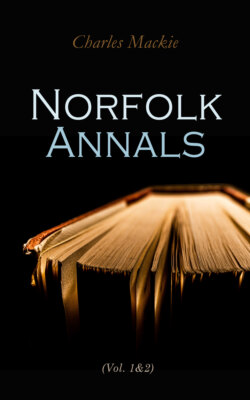Читать книгу Norfolk Annals (Vol. 1&2) - Charles Mackie - Страница 179
На сайте Литреса книга снята с продажи.
JUNE.
Оглавление1.—Died in London, aged 53, Mr. Robert Herring, of Bracondale, Norwich. He was alderman for South Conisford Ward, served the office of Sheriff in 1791, and was Mayor in 1807. Mr. Thomas Thurtell, of Lakenham, was elected to the vacant aldermanship on June 6th.
—A public meeting was held at the Guildhall, Norwich, when resolutions were moved by Mr. E. Taylor in opposition to the Corn Bill. The resolutions, which were unanimously adopted, represented that the citizens had for twenty years suffered great privations and hardships from the advance in price of all necessaries of life, and particularly of “bread corn,” that they viewed with alarm the measure introduced in Parliament as calculated to raise the price of grain; and that the proposed alterations in the Corn Laws were ill-timed, unwise, and oppressive.—The “Bill for Regulating the Importation Duties” was defeated in the House of Commons by a majority of ten on June 6th, and on the arrival of the intelligence by the Newmarket mail on the 8th, the horses were removed from the coach, which was drawn for three hours through the streets. Persons with large loaves of bread on their heads were on the box seat, bells were rung, and pistols fired, and at midnight a bonfire was lighted in the Market Place, and many depredations were committed by those who obtained the materials with which to feed the flames.
3.—The Expedition coach arrived at Norwich with news of the definite Treaty of Peace, which was signed in Paris on the 30th ult. Amid great rejoicings the people dragged the coach four times round the Market Place, and through the principal streets. On the 15th 500 freemen of the Long Ward were entertained by Mr. S. Mitchell to a dinner of roast beef at Harper’s Gardens; on the 16th the Mayor entertained the parochial poor, and there was a grand illumination in the evening. Peace was formally proclaimed on the 27th by the Mayor and Corporation walking in procession to various parts of the city. Before being admitted to the Close the Mayor knocked thrice at the gate, and informed Mr. J. Kitson, the Bishop’s registrar, that admittance was asked by virtue of his Majesty’s writ. The proclamation was then made in the Cathedral precincts, and on returning to the Guildhall the Corporation partook of refreshments. Mr. Sheriff Higgins entertained the company to dinner at his house in Pitt Street, and also feasted the poor. Thanksgiving services were held on July 7th, and 723 charity children were entertained in St. Andrew’s Hall. On the 20th at a quarterly assembly of the Corporation an address was voted to the Prince Regent congratulating him on “the highly honourable and auspicious Peace concluded with France.”
20.—Mr. Robert Partridge, alderman, presented to the Corporation of Norwich “an elegant tripod in the Grecian style, to support a silver candelabrum of three lights, surmounted with the figures of St. George and the Dragon,” given by him in 1786.
21.—Guild Day was held in the “old style” at Norwich by Mr. J. W. Robberds on his being sworn in as Mayor. The feast at St. Andrew’s Hall was attended by upwards of 500 guests, and a ball took place in the evening at Chapel Field House.
22.—A Musical Festival, “in celebration of the Peace,” commenced at the church of St. Peter Mancroft, Norwich, with a performance of “Judas Maccabaeus.” The “Messiah” was given on the 23rd, and a selection of sacred music on the 24th. On each evening a miscellaneous concert took place in St. Andrew’s Hall. The principal performers were Madame Catalani, Miss Stephens, Miss Booth, Mr. Braham, Mr. Garbett, Mr. Turner, and Mr. Welsh; leader of the band, Dr. Hague; organ and pianoforte, Mr. Beckwith.
